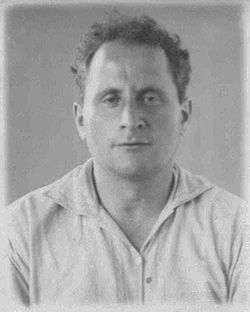David A. Frank-Kamenetskii
| David A. Frank-Kamenetskii | |
|---|---|
|
David A. Frank-Kamenetskii, mid 1930s | |
| Born |
3 August 1910 Vilna, Russia, (Now Vilnius, Lithuania) |
| Died |
2 June 1970 (aged 59) Moscow, Soviet Union |
| Nationality | Russian |
| Fields | Physics, Chemistry |
| Alma mater | Tomsk Technological Institute |
| Doctoral advisor | Nikolay Nikolaevich Semenov |
| Known for |
Thermal explosion theory Plasma physics Astrophysics |
| Notable awards |
Triple USSR State Prize laureate, Mendeleev Prize (1949), Lenin Order, Order of the Working Red Labour |
| Spouse |
Klavdiva A. Kopytova née Frank-Kamenetskii (1932–1935) Elena E. Fridman |
David Albertovich Frank-Kamenetskii (Russian: Давид Альбертович Франк-Каменецкий, August 3, 1910, Vilna, Russia - June 2, 1970, Moscow, Soviet Union) was a Soviet theoretical physicist and chemist, professor and doctor of physical, chemical and mathemetical sciences. He developed the thermal explosion theory, worked on plasma physics problems and in astrophysics.
Life
David A. Frank-Kamenetskii was born on 1910, August 3 in Vilna (Russia; now Vilnius, Lithuania) in a Jewish family. His parents were Albert G. Frank-Kamenetskii (1873–1935) and Anna A. Frank-Kamenetskii (née Hannah A. Arons; 1883–1948). In 1917-1918 the family left Vilna, spent one year near Moscow and finally resided in Irkutsk (Eastern Siberia), where Albert G. Frank-Kamenetskii became the chair of the Chemistry Department in the newly organized Irkutsk State University. In 1931 Frank-Kamenetskii graduated from the Siberian Technological Institute (now Tomsk Polytechnic University, Tomsk, Russia) in Metallurgy Engineering.
In 1932 he married Klavdia A. Kopytova and in the same year their daughter Tema was born. From 1931 to 1934 Frank-Kamenetskii worked as a mining engineer in the Chita gold mines in Eastern Siberia and he was also teaching in a Chita engineering college.
In 1934 Frank-Kamenetskii wrote a letter to Professor Nikolay Nikolaevich Semenov in Leningrad (now Saint Petersburg, Russia) about chemical thermodynamics. Being impressed by the letter, Professor Semenov invited Frank-Kamenetskii to join the Institute of Chemical Physics as a graduate student. The Institute of Chemical Physics of the USSR Academy of Sciences was organized by Professor Semenov in 1931 in Leningrad. From 1934 to 1941 Frank Kamenetskii lived in Leningrad and worked in the Institute of Chemical Physics. He met here Yakov Borisovich Zel'dovich and started a close friendship and a fruitful collaboration with him. He published several chemical papers in the topics of chain reactions, combustion theory and periodic chemical reactions.
In 1935 Frank-Kamenetskii divorced from his first wife Klavdia and married to Elena E. Fridman (1910–1992). Their first son was born two years later (Albert D. Frank-Kamentskii, 1937–1979). In 1938 Frank-Kamenetskii received his Candidate of Sciences (CSc) degree (PhD equivalent) in chemistry from the Institute of Chemical Physics.
After the Nazi Germany invasion at the Soviet Union (Operation Barbarossa) in June, 1941, Frank-Kamenetskii and his family was evacuated to Kazan on the Volga River, where the Institute of Chemical Physics was relocated. During the family relocation, the second son, Maxim (1941- ), was born in Gorky. During years 1941 to 1944 he worked in Kazan on the problem of graphite conversion to diamond. In 1943 he received the Doktor Nauk degree (DSc equivalent) in physics and mathematics from the USSR Academy of Sciences.
In 1944-1946 Frank-Kamenetskii lived in Gorky (now Nizhny Novgorod, Russia) and headed the Department of Technical Chemistry of the Gorky State University (now Nizhny Novgorod State University).
In 1947-1948 Frank-Kamenetskii lived in Moscow and worked in the Institute of Chemical Physics. In 1947 he published his major work "Diffusion and Heat Transfer in Chemical Kinetics" in Russian. Between 1948 and 1956 Frank-Kamenetskii lived in Sarov and worked on the Soviet atomic bomb project in the secret military research institute codenamed "Arzamas-16" or the "Installation". (In 1993, the Sarov became a sister city to Los Alamos, New Mexico, USA).
In 1952 his second daughter, Maria was born and in the same year he suffered a major heart attack. In 1956 Frank-Kamenetskii left the "Installation" for Moscow. Between 1956 and 1970 Frank-Kamenetskii was the head of a laboratory in the I. V. Kurchatov Institute of Atomic Energy and organized and headed the Department of Plasma Physics at the Moscow Institute of Physics and Technology. He was teaching plasma physics and published several major works in plasma physics and biophysics. Between 1960 and 1970 he was the editor of the major Russian popular science magazine, Priroda (Природа, in English: Nature). Frank-Kamenetskii died in Moscow on 2 June 1970 due to a heart failure.
-

with daughter Maria, Sarov, 1953
-

in Suzdal near Moscow, mid-1960s
-

with his former students in Moscow, late 1960s
-

Moscow, late 1960s
Significant works
- Frank-Kamenetskii, David A. (1947), Diffusion and Heat Transfer in Chemical Kinetics (in Russian), Moscow-Leningrad: USSR Academy of Science Press (other Russian editions: 1967, 1987, NAUKA Press; 2008, Intellekt Press; in German: 1959, Springer-Verlag; in English: 1955, Princeton University Press; 1969, Plenum Press)
- Frank-Kamenetskii, David A. (1948), Energy in Nature and Technology (in Russian), Moscow: KULTPROSVET Press
- Frank-Kamenetskii, David A. (1959), The Formation of Chemical Element's in the Depths of Stars (in Russian), Moscow: ZNANIE Press
- Frank-Kamenetskii, David A. (1959), Physical Processes in Stellar Interiors (in Russian), Moscow: FIZMATGIZ Press (in English: 1962, Israel Program for Scientific Translations)
- Frank-Kamenetskii, David A. (1968) [1961–1963], Plasma-The Fourth State of Matter (in Russian) (3rd ed.), Moscow: GOSATOMIZDAT
- Frank-Kamenetskii, David A. (1967), Nuclear Astrophysics (in Russian), Moscow: ZNANIE (in English: 1972, Plenum Press; also published in Bulgarian, Polish, Czech, Slovak, German and Japanese)
- Frank-Kamenetskii, David A. (1968) [1964], Lectures on Plasma Physics (in Russian) (2nd ed.), Moscow: ATOMIZDAT (other Russian edition: 2008, Intellekt Press; in German: 1967, DVW; in Polish: 1968, Panstwowe Wydawnictwo Naukowe)
